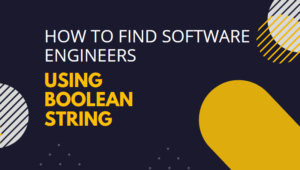
Mastering Boolean logic techniques is crucial for becoming a skilled talent sourcer, as most of my daily tasks involve searching for potential applicants. To aid in my search for software engineers, I have created a cheat sheet with examples of Boolean strings. According to Wikipedia, a software engineer is defined as an individual who utilizes the concepts of software engineering to design, develop, maintain, test, and evaluate computer software.
Why use Boolean Strings in the first place?
“software engineer” AND “Python” – This will search for software engineers who have experience with the programming language Python.
“software engineer” AND “JavaScript” AND “React” – This will search for software engineers who have experience with both JavaScript and the React library.
“software engineer” AND “machine learning” – This will search for software engineers who have experience with machine learning.
“software engineer” AND “Java” AND ( “Agile” OR “Scrum” ) – This will search for software engineers who have experience with Java and either Agile or Scrum development methodologies.
“software engineer” AND “C++” NOT “QA” – This will search for software engineers who have experience with C++ and not QA.
It’s important to note that different platforms use different syntax for Boolean search, so you should always consult the platform’s documentation. Also, you can use parentheses to group and order your search terms, which is helpful to refine your search results.
What’s the Difference Between Front End and Back End Development?
Front-end and back-end engineers are two different types of software engineers that specialize in different aspects of the software development process.
Front-end engineers, also known as client-side engineers, are responsible for the design and development of the user interface of a web or mobile application. They use languages such as HTML, CSS, and JavaScript to create the look and feel of the application, and ensure that it is visually appealing and easy to use. Front-end engineers work closely with designers and user experience (UX) experts to create a seamless and intuitive user experience.
Back-end engineers, also known as server-side engineers, are responsible for the functionality of the application. They use programming languages such as Python, Java, Ruby, and PHP to create and maintain the application’s servers, databases, and APIs. They are responsible for the application’s logic and functionality, and work closely with front-end engineers to ensure that the application is stable and performs well.
In summary, front-end engineers focus on the user interface and user experience of the application, while back-end engineers focus on the application’s functionality and performance.
Front End Languages: HTML, CSS, Javascript
Back End Languages: Ruby, Python, Java, C, C#, C++, Javascript/Angular/Reat etc.
The following are examples of Boolean strings that can be used to search for software engineers online. With an understanding of the distinctions between front-end and back-end engineers, you can also include relevant languages in your search query.
Here are the basics to search operators and query modifiers:
AND (or a space)
To search for two or more words list each word followed by a space. Remember that putting an AND between the keywords is an option.
OR
Use OR to find pages that may have just one of several words in a phrase. OR must be capitalized.
“ “ Quotation
Surround a phrase with quotation marks to search for that exact phrase.
-job -jobs
Put a – minus sign before a word to exclude results containing that word.
site:
Xray an entire site for keywords.
:intitle :inurl
Get results that contain a certain word in the page title or the page URL.
Searching on Social Media sites:
intitle:resume site:github.* javascript engineer
site:github.com “software engineer” “joined on”
site:github.com/orgs/*/people
site:meetup.com “member since” ruby
site:stackoverflow.com/users -“Keeping a low profile.” “software engineer” AND “Java”
site:com/author “software developer|engineer” “rust”
site:hackerrank.com/profile (python sql OR python nosql)
site:www.linkedin.com/in data engineer python
site:meetup.com inurl:member intitle:data.science
Resume search examples:
site:slideshare.net resume “developer”
site:docs.google.com engineer javascript
site:zoominfo.com/p/ “apple inc.” “developer”
site:scribd.com (CV OR Vitae) “minneapolis” “developer”
“* * developer|engineer” (c rust OR c++ rust) inurl:resume -inurl:pdf
(intitle:resume OR intitle:cv) (“software engineer” OR developer) (Java OR C++) -job -jobs -sample -examples
site:com/cv OR site:com/resume “developer|engineer” (c rust OR c++ rust) -stackoverflow
site:”-*-” resume “developer|engineer” (c rust OR c++ rust) -job|jobs “gmail.com”
“resume|cv.tex at master * github” python spark scala
inurl:resume.resume “software developer|engineer” “gmail.com”
Advanced Search String Examples:
((“object oriented design” OR “ood” OR “design patterns” OR “design pattern” OR “software design”) AND (“java” OR “python” OR “c++” OR “c#” ) AND (“system architecture” OR “distributed systems” OR “algorithms” OR “subversion” OR “software development” OR “software engineering” ))
((“java” OR “python” OR “c++” OR “c#” ) AND (“system architecture” OR “distributed systems” OR “algorithms” OR “subversion” ) AND (“design patterns” OR “design pattern” OR “software design” OR “software development” OR “software engineering” ))
((“system architecture” OR “distributed systems” OR “algorithms” OR “Data Structure” ) AND (“design patterns” OR “design pattern” OR “software design” OR “software development” OR “software engineering” OR “System Design”) AND (2012 OR 2013 OR 2014 OR 2015 OR 2016 OR 2017))
((“Software Engineer” OR “Software Developer” OR “Developer” OR “Engineer” OR “Software Development Engineer” OR “SWE” OR “MTS” OR “SDE”) AND (“INSERT A LIST OF TARGET COMPANIES”))
((“java” OR “python” OR “c#” OR “c++” ) AND (“algorithms” OR “algorithm” OR “data structures” OR “data structure” )) AND (“software design” OR “software development” OR “software engineering”))
((“system architecture” OR “distributed systems” OR “distributed computing” OR “algorithms” OR “Data Structure” ) AND (“software design” OR “software development” OR “software engineering” OR “System Design”) AND (“Senior Software Engineer” OR “Technical Lead” OR “Tech Lead” OR “Lead Engineer” OR “Lead Developer” OR “Senior Lead” OR “Principal Software Engineer” OR “Principle Engineer” OR “Senior Engineer” OR “Senior Technical Staff” OR “Principal Engineer”) NOT (Manager OR Embedded OR Mobile OR 2019 OR 2020 OR Intern OR Internship))
((“java” OR “python” OR “c++” OR “c#” OR “Ruby” OR “ood” OR “Programming” ) AND (“algorithms” OR “Data Structure” OR “algorithm” OR “Courses”) AND (2012 OR 2013 OR 2014 OR 2016 OR 2017 OR 2018) NOT (“Senior” OR “Sr” OR “Manager” OR “Staff” OR “Principal” OR “Lead”))
((software AND design* OR architect* OR develop* AND patent AND (services OR soa OR rest OR scale* OR mongo OR nosql OR soap ) AND (java OR c# OR c++ OR python OR ruby OR groovy) AND NOT (pmp OR embedded OR sas OR cobol OR as400 OR iseries OR lab126 OR audible OR imdb OR imdb.com OR faculty OR qae))
((java or C# or C++ or Python) AND (“developed” or “created” or “API” or “Microservices”) AND (“SDE” or “software engineer” or “software developement engineer”))
((java OR c++ OR c# OR python) AND (programmer OR engineer OR developer OR SDE) AND (algorithms OR “machine learning” OR “computer science*” OR problem*) AND (design* OR “object oriented” OR “object-oriented” OR soa OR “service oriented” OR”AWS” OR “Azure” OR “Rest” OR “web services” OR “service” ) AND NOT (abap OR waterfall OR embedded OR director OR pmp OR vice OR president OR ceo OR cio OR cto OR ETL OR))
Overall, expand on these strings and edit or change the keywords to focus in on different requirements.
Bonus: Do you want more Boolean String examples? Check out my full list (here).
Recommended Reading:
Top Boolean Strings to Find Diversity Candidates Online
How to Attract and Hire Software Engineers
A Simple Way to Find GitHub User Emails
- Unlocking the Power of Perplexity AI: Why Recruiters Should Utilize This Revolutionary Tool - February 11, 2024
- Exploring AI Interviewing Assessment Tools: A Comprehensive Review - November 30, 2023
- PartyRock a Sandbox for Talent Sourcing - November 29, 2023

I’m curious as to why you use (()) to open and close some of your long search stings? Would it make a difference if I did, for example: (react OR javascript OR “react.js”) AND (“software developer” OR “software engineer” OR “application developer”) versus ((react OR javascript OR “react.js”) AND (“software developer” OR “software engineer” OR “application developer”))